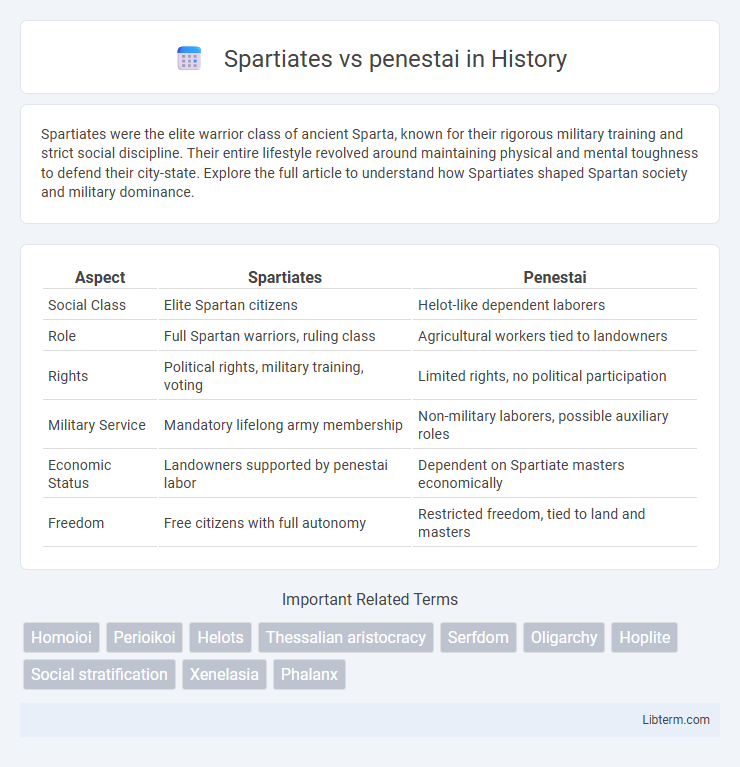Spartiates were the elite warrior class of ancient Sparta, known for their rigorous military training and strict social discipline. Their entire lifestyle revolved around maintaining physical and mental toughness to defend their city-state. Explore the full article to understand how Spartiates shaped Spartan society and military dominance.
Table of Comparison
| Aspect | Spartiates | Penestai |
|---|---|---|
| Social Class | Elite Spartan citizens | Helot-like dependent laborers |
| Role | Full Spartan warriors, ruling class | Agricultural workers tied to landowners |
| Rights | Political rights, military training, voting | Limited rights, no political participation |
| Military Service | Mandatory lifelong army membership | Non-military laborers, possible auxiliary roles |
| Economic Status | Landowners supported by penestai labor | Dependent on Spartiate masters economically |
| Freedom | Free citizens with full autonomy | Restricted freedom, tied to land and masters |
Introduction to Spartiates and Penestai
Spartiates, the elite warrior class in ancient Sparta, possessed full citizenship rights and were dedicated to military training and governance, ensuring the dominance of Spartan society. Penestai, on the other hand, were a subjugated servile class tied to the land, working primarily as agricultural laborers under Spartan landowners without political rights or military obligations. This rigid social hierarchy maintained the Spartan state's military prowess while controlling essential agricultural production through the penestai workforce.
Historical Origins of the Spartiates
The Spartiates, the elite warrior class of ancient Sparta, originated from the Dorian invaders who settled in the Peloponnesus around the 10th century BCE, shaping a militaristic society focused on discipline and communal living. In contrast, the penestai were a servile class, likely indigenous inhabitants or their descendants, who worked the land under the control of the Spartiates and formed the backbone of Sparta's agrarian economy. The rigid social stratification enabled the Spartiates to maintain their dominant status, ensuring their exclusive participation in military and political spheres while relying on the penestai for economic sustenance.
The Emergence of the Penestai Class
The penestai emerged as a dependent class in Laconian society, primarily serving as agricultural laborers bound to the land owned by Spartiates, the elite warrior-citizens of Sparta. Unlike the Spartiates, who held full political and military privileges, the penestai lacked personal freedom and were obligated to provide produce and services, reinforcing the socio-economic hierarchy. This class distinction played a crucial role in maintaining Spartan military dominance while ensuring economic stability via the labor-intensive support provided by the penestai.
Social Hierarchies in Ancient Greece
Spartiates occupied the highest social tier in Ancient Sparta, enjoying full political rights and owning land worked by penestai, a dependent class bound to agricultural labor. Penestai, often compared to serfs, were crucial to Spartan economy but lacked citizenship and political power, illustrating a rigid, militarized social hierarchy distinct from other Greek city-states. This division underpinned Sparta's militaristic society, with Spartiates dedicating themselves to warfare and governance while penestai sustained the agrarian base.
Roles and Responsibilities of Spartiates
Spartiates, the elite warrior class in Spartan society, held exclusive rights to full citizenship and bore the primary responsibility for military service and governance. They trained rigorously from youth in the agoge system to maintain supreme combat skills and upheld the political structure by participating in the Gerousia (council of elders) and the Apella (assembly). In contrast, penestai were lower-class serfs tied to the land, tasked with agricultural labor and providing economic support without political or military privileges.
The Daily Life of the Penestai
The daily life of the Penestai in Spartan society was marked by servitude and agricultural labor, as they worked the land owned by the Spartiates, the full Spartan citizens. While Spartiates devoted themselves to military training and governance, Penestai were bound to support this elite class through farming and menial tasks, living under strict social restrictions with limited personal freedom. Their existence was essential to sustaining the Spartan economy, enabling the Spartiates to maintain their warrior lifestyle without engaging in manual labor.
Economic Functions of Each Group
Spartiates controlled the land and resources, serving as the elite warrior class whose wealth came from the labor of subordinate groups. Penestai functioned as serfs or bonded laborers who cultivated the land and produced agricultural goods, sustaining the Spartan economy. The economic reliance on Penestai allowed Spartiates to focus exclusively on military training and governance without engaging in manual labor.
Legal Status and Rights Compared
Spartiates held full citizen status in ancient Sparta, possessing political rights such as voting in the Apella and eligibility for public office, while penestai were a class of dependent laborers lacking citizenship and political privileges. Legally, Spartiates enjoyed protections under Spartan law and participated in communal decision-making, whereas penestai were bound to landowners, subject to control, and had limited legal autonomy. The stark contrast in legal status reflected a rigid hierarchical society where Spartiates maintained military and political dominance, and penestai functioned primarily as serfs or agricultural workers with restricted freedoms.
Martial Traditions: Warriors vs. Laborers
Spartiates, the elite warrior class of Sparta, upheld rigorous martial traditions centered on intensive military training, discipline, and excellence in combat from a young age. Penestai, primarily laborers and serfs, were tasked with agricultural and domestic duties, supporting the Spartan economy while lacking the rights and training of Spartiates. The clear division between Spartiates' warrior ethos and Penestai's labor roles reinforced Sparta's militaristic society and social hierarchy.
Legacy and Lasting Impact on Greek Society
Spartiates, as full Spartan citizens, established a rigid social hierarchy that solidified military discipline and civic duty, shaping Spartan identity and governance. Penestai, as a dependent labor class, contributed significantly to Spartan agricultural economy but remained socially subordinate, reflecting the entrenched social stratification. The legacy of this division influenced Greek societal structures, highlighting the interplay between militaristic elitism and servitude in maintaining Spartan dominance and stability.
Spartiates Infographic

 libterm.com
libterm.com